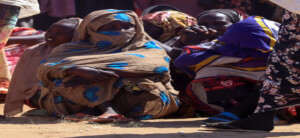Pharmacists report major medicine gap in Sudan
On Thursday, the Pharmaceutical Professionals Alliance painted a bleak picture of the availability of medicines in the country. This morning, Sudan’s federal Ministry of Health reported a total of 9,663 coronavirus cases in the country as of June 30.
At least 604 people died and 4,624 patients recovered since the first Covid-19 patient was recorded in the country in March.
The Pharmaceutical Professionals Alliance reported a medicine gap of more than $270 million.
 A pharmacy in the outskirts of Khartoum (File photo)
A pharmacy in the outskirts of Khartoum (File photo)
On Thursday, the Pharmaceutical Professionals Alliance painted a bleak picture of the availability of medicines in the country. This morning, Sudan’s federal Ministry of Health reported a total of 9,663 coronavirus cases in the country as of June 30.
At least 604 people died and 4,624 patients recovered since the first Covid-19 patient was recorded in the country in March.
At a press conference of Pharmaceutical Professionals Alliance in Khartoum on Thursday, spokesman Salah Jaafar reported a medicine gap of more than $270 million.
He described the “unprecedented scarcity” as “disastrous, both in the public and private sectors”, as the volume of imported medicines during the past six months fell to nine per cent of the medications required in the country.
Of the medicines available in the country, 76 percent will end within two months, Jaafar warned. Many patients may die due to the lack of life-saving medicines, including those needed for the treatment of cancer as well as dialysis supplies.
“The government should set clear policies with regard to the problem, and provide $55 million a month for the import of medicines,” he said. “Medication should be a priority ahead of fuel.”
Made in Sudan
According to Mohamed Jamal, representative of the Khartoum Pharmacists Committee, local manufacturing covers 30 percent of the country's need for medicine.
However, 20 percent of the Sudanese medicine industry is losing money, because of the import of raw materials in foreign currency that have to bought on the parallel market, the increased costs of production due to the lack of electricity and the use of expensive diesel they are forced to buy from private dealers, along with the increase in salaries in the country.
Jamal reported “a complete lack of psychiatric medications, and medicines for chronic diseases such as high blood pressure, diabetes, and defects of the heart and arteries”, in addition to “simple anti-biotics and pain killers”.
Radio Dabanga’s editorial independence means that we can continue to provide factual updates about political developments to Sudanese and international actors, educate people about how to avoid outbreaks of infectious diseases, and provide a window to the world for those in all corners of Sudan. Support Radio Dabanga for as little as €2.50, the equivalent of a cup of coffee.












 and then
and then